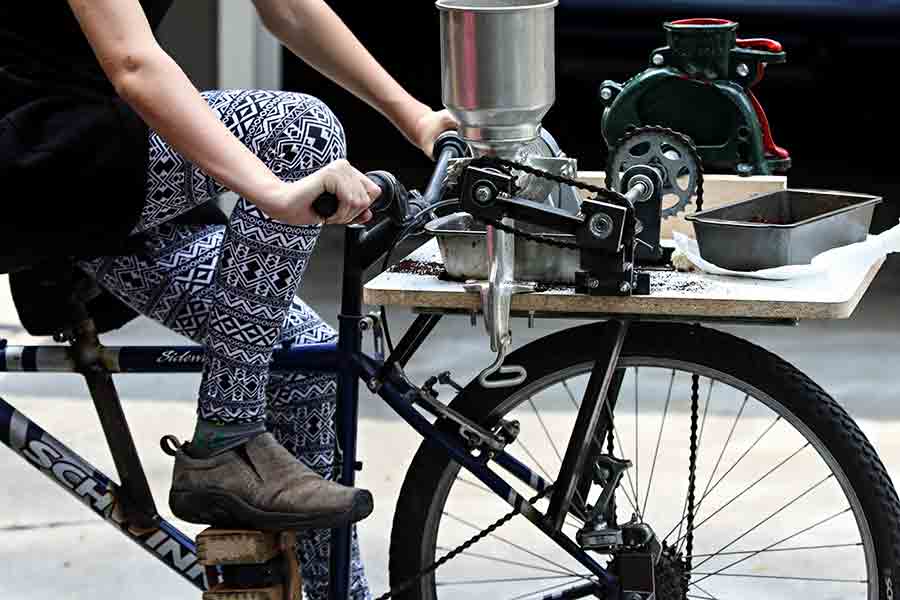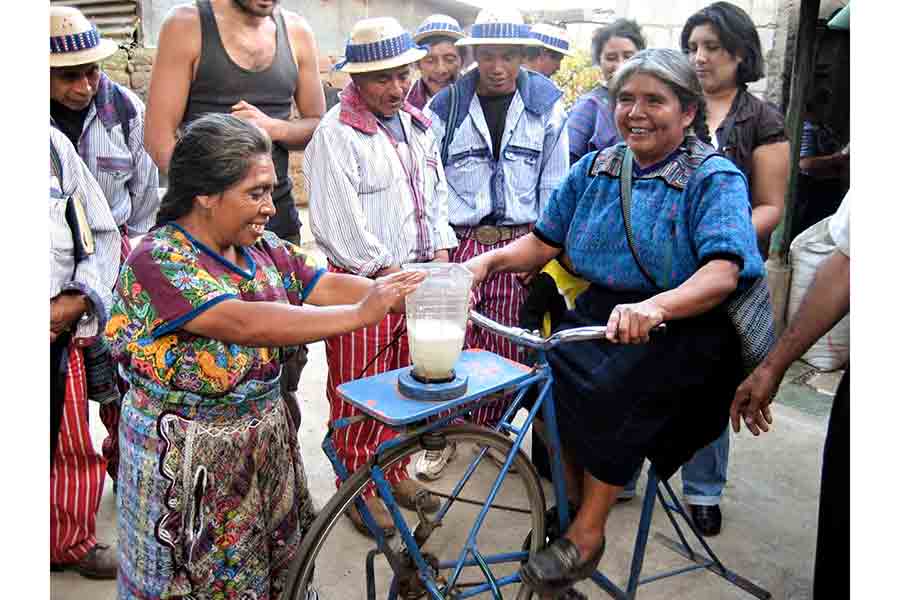Building a Better World Through Discarded Bikes
Sept. 7 event in Whitefish to showcase pedal-powered machines that are improving lives of Indigenous people in Guatemala
By Myers Reece
Veronica Buch and Mario Juarez believe an old bike can change the world. The Bill & Melinda Gates Foundation Discovery Center agrees.
Buch and Juarez are the president and director, respectively, of Maya Pedal, a non-governmental organization (NGO) that converts discarded bicycles into pedal-powered machines used by Indigenous people in Guatemala who often live without electricity. The pedal-powered machines can be used as water pumps for communities or to perform other critical tasks that are otherwise laborious and time-consuming, perhaps impossible, without electricity or access to prohibitively expensive machinery.
Among those tasks performed by the different types of converted bikes are milling grain, cobbing and grinding corn, blending shampoos, grinding coffee, separating jute fibers to make burlap, manufacturing concrete roof tiles, washing clothes, and more.
Nearly 400 of Maya Pedal’s bikes were donated by Montanans last year, many from the Flathead Valley, thanks to a Treasure State connection that runs through Columbia Falls resident Dave Renfrow, who is heavily involved with the organization as the volunteer coordinator for the support group Maya Pedal USA.
Renfrow is bringing Buch to Whitefish on Sept. 7 for an event at the O’Shaughnessy Center that will showcase the machines, including demonstrations of grinding coffee and corn for tortillas, and also offer freshly prepared traditional Mayan cuisine, activities and a silent auction to benefit Maya Pedal families.
“We’ll make coffee and tortillas with the Mayans,” Renfrow said. “I think it will be a lot of fun.”
The Whitefish event is one of two upcoming presentations by Buch, the other in Seattle for an exhibit at the Bill and Melinda Gates Foundation Discovery Center from Sept. 13 to May 11, 2019 showcasing “the important role that design and innovative approaches can play in solving some of the world’s most critical challenges,” according to Charlotte Beall, deputy director for the center.
The Maya Pedal organization says over 100,000 families live without clean water in Guatemala, a reality shared by other Latin American countries. Furthermore, many Mayans in Guatemala depend on manual subsistence farming and average less than $6 each day in income per family, with 30 percent of children experiencing malnutrition.
“A large income gap exists between advanced industrial societies and rural areas of developing countries,” Maya Pedal states. “Pedal powered machines are an appropriate technology to help bridge the gap.”
The bike machines provide a mechanism not only to pump water from up to 95 feet below the earth’s surface, but also to complete tasks five to 20 times as efficiently as by hand, offer micro-business opportunities and raise income. Bike-powered pumps provide water for humans and animals, as well as irrigation, and Maya Pedal also sets up low-cost filtration systems to ensure clean water.
“Our machines provide opportunity,” Buch said.

If a family generates more income thanks to the bike machines, or “bicimaquinas,” children can stay in school rather than working on the farm, and intact families with greater financial stability are less likely to attempt the often dangerous trek north into the U.S. A poster for the Sept. 7 event in Whitefish features the tagline: “easing the migrant crisis through empowerment and self-sufficiency.”
The machines are a relatively inexpensive solution to major real-world problems, Renfrow said, and they last for decades, can be user maintained and repaired, and emit no pollution.
“It’s a simple solution for complex times,” Renfrow said. “That’s why I love Maya Pedal.”
Renfrow is a bicycle tourist who, after reading about the organization and while on a bike tour in Central America, stopped by the Maya Pedal shop where the machines are built, at the home of Buch and Juarez in San Andres Itzapa, Guatemala, and has been involved with the organization ever since. The workshop hosts volunteers who help manufacture the machines onsite.
The organization partners with local Mayans to assess community needs in remote areas of Guatemala. Once the needs are identified, Maya Pedal seeks donations to fund the appropriate machines, builds them, and then delivers and installs them, typically within four months of funding.
One of the organization’s goals is empowering Mayan women and kids, particularly girls, who learn not only to construct and work on the bicimaquinas but also about promoting and maintaining clean water in their communities. Mayan men often work long days in the field, so it’s the women who are most likely to use a machine to either complete domestic tasks or start up a side business.
Buch is also Guatemala’s representative for the organization Rise Up’s “Let Girls Lead” initiative, which works to “build a global movement of leaders to ensure that girls can finish school, stay healthy, escape poverty, and overcome violence,” impacting 40 million girls in Africa and Central America, according to the program’s website.
Among the business ventures Mayans have taken on thanks to bike machines are shampoo production using aloe grown at their homes and mixed by a pedal-powered blender; milling organic animal feed; and making burlap from jute plants to be used in crafts sold at markets, among others.
The machines have the dual effect of opening up new opportunities for Mayans while allowing them to preserve ancient traditions, albeit more efficiently.
“The Maya people may be the last best chance to preserve indigenous culture in the world,” Maya Pedal’s website states. “The Maya culture, its archeology, arts, crafts, agriculture and customs have survived 500 years of colonial rule and 36 years of civil war, yet today, adapting to the 21st century is the greatest challenge in the Mayans’ long history.”
Tickets for the Sept. 7 “Power the Pedal” Whitefish event, for which doors open at 6 p.m., are available at www.eventbrite.com and in limited quantities at the door. For more information, contact Dave Renfrow at (406) 250-9882 or [email protected]. To learn more about Maya Pedal, including how to volunteer or donate, visit www.maya-pedal.org.